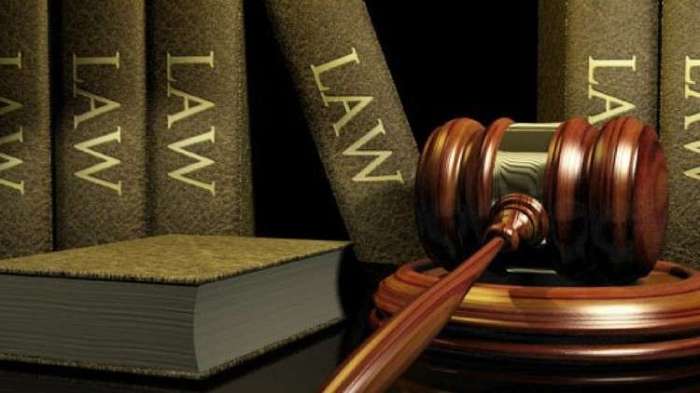Legal law serves as the backbone of societal order, establishing essential principles that govern our interactions and ensure justice. It encompasses a wide array of topics, from the fundamental differences between civil and criminal law to the intricate processes involved in legal trials. Understanding legal law is crucial as it not only shapes individual rights but also reflects the ever-evolving nature of our legal landscape.
This exploration delves into the core aspects of legal law, outlining its importance, the various types that exist, and the responsibilities that accompany legal rights. Additionally, we will highlight current trends affecting legal law, including the influence of technology and the growing need for privacy protections in a globalized world.
Legal Law Fundamentals

Legal law represents the foundation of the legal system, influencing myriad aspects of society including governance, justice, and individual rights. Understanding its fundamentals is crucial for recognizing how laws shape human interactions and societal structure. Legal law encompasses the rules, principles, and regulations that govern conduct, thereby ensuring order and justice in community relations.The significance of legal law in society is manifold.
It not only regulates the behavior of individuals and organizations but also serves as a mechanism for conflict resolution and the protection of rights. Legal law establishes the framework within which justice is administered, thereby promoting fairness and accountability. This framework ensures that individuals and entities can seek remedies for grievances and that societal norms are upheld.
Key Principles of Legal Law
The key principles of legal law underpin the entire legal system, providing a foundation for its operation. The following are essential principles that define legal law:
- Rule of Law: This principle maintains that the law applies equally to all individuals, ensuring that no one is above the law. It emphasizes accountability and adherence to established legal frameworks.
- Justice: Legal law is fundamentally concerned with justice, which encompasses fairness in the application of laws and the protection of individual rights. The legal system aims to provide equitable solutions to disputes.
- Separation of Powers: This principle divides government responsibilities into distinct branches to prevent the concentration of power. Each branch—legislative, executive, and judicial—serves as a check on the others, promoting balanced governance.
- Protection of Rights: Legal law serves to protect the fundamental rights of individuals, such as the right to free speech, the right to a fair trial, and the right to privacy. These protections are vital for individual freedom and societal harmony.
Importance of Legal Law in Society
Legal law plays a pivotal role in maintaining order and promoting social justice. It is essential for the functioning of society, providing a framework that governs interactions and resolves disputes. The importance of legal law can be highlighted through its influence on various societal aspects such as:
- Social Stability: Legal law fosters social stability by regulating behavior and establishing consequences for violations. This promotes a safer environment for individuals to live and work.
- Economic Growth: A well-defined legal framework encourages business operations and economic transactions, as it assures parties that agreements will be honored and disputes settled fairly.
- Protection Against Abuse: Legal law provides mechanisms for individuals to challenge unlawful actions and seek justice, thereby protecting against abuse of power and exploitation.
- Promotion of Equality: Legal law aims to eliminate discrimination and ensure equal treatment for all individuals, fostering a more inclusive society.
Difference Between Civil Law and Criminal Law, Legal law
Understanding the distinction between civil law and criminal law is crucial for comprehending the scope and application of legal law. Both branches operate under the same legal system but address different types of offenses and remedies.
- Civil Law: This branch deals with disputes between individuals or organizations, typically involving claims for compensation or specific performance. Examples include contract disputes, property disputes, and family law cases. The objective is to resolve conflicts and provide a remedy to the injured party.
- Criminal Law: This area of law pertains to offenses against the state or society as a whole. Criminal law involves prosecution by the government, aiming to deter harmful behavior through punishment. Examples include theft, assault, and murder. The primary objective is public safety and the maintenance of order.
“Legal law serves as the backbone of a just society, ensuring that rights are protected and responsibilities are upheld.”
Legal Procedures and Processes
Legal procedures and processes form the backbone of the judicial system, guiding the progression of cases through courts. Understanding these steps is essential for all parties involved, from plaintiffs to defendants, legal professionals, and even the general public. This framework ensures that justice is delivered fairly and systematically, adhering to established laws and regulations.
Steps Involved in a Legal Trial
A legal trial is a structured process that typically follows specific stages designed to ensure thorough examination and fair adjudication of the case. The steps include:
1. Jury Selection
In trials that involve a jury, the selection process is crucial. Potential jurors are questioned to ensure impartiality and suitability for the case.
2. Opening Statements
Both parties present their opening statements, outlining the case and the evidence they intend to present.
3. Presentation of Evidence
This stage involves witness testimonies, expert opinions, and the submission of documents. Each side presents its evidence to support its claims.
4. Cross-Examination
After each witness is presented, the opposing party has the opportunity to cross-examine them to challenge their credibility and the evidence presented.
5. Closing Arguments
Each party summarizes their case, arguing why the evidence supports their position.
6. Jury Deliberation
If a jury is present, they will deliberate in private to reach a verdict based on the evidence.
7. Verdict
The jury or judge delivers the verdict, determining the outcome of the case.
Procedures for Filing a Lawsuit
Filing a lawsuit is a formal process that requires compliance with specific legal requirements and procedures. Understanding these steps is vital for plaintiffs seeking to pursue a legal claim. The following Artikels the typical procedure:
1. Consultation with an Attorney
It is advisable to seek legal counsel to understand the merits of the case and the best course of action.
2. Drafting the Complaint
The plaintiff’s attorney prepares a legal document, known as a complaint, detailing the claims against the defendant.
3. Filing the Complaint
The complaint is filed with the appropriate court, accompanied by a filing fee.
4. Serving the Defendant
The defendant must be formally notified of the lawsuit through a process called service of process.
5. Response from Defendant
The defendant is required to file a response, which may include counterclaims or defenses against the allegations.
6. Discovery Phase
Both parties engage in discovery, where they exchange information and gather evidence relevant to the case.
7. Pre-Trial Motions
Prior to the trial, parties can file motions to resolve issues or dismiss parts of the case.
Roles of Various Legal Professionals in Court
The courtroom is a collaborative environment where various legal professionals play essential roles in ensuring the judicial process operates smoothly and fairly. Each professional has distinct responsibilities that contribute to the overall functioning of a trial:
Judge
The judge oversees the proceedings, makes rulings on legal matters, and ensures that the trial adheres to the law.
Attorneys
Both plaintiff’s and defendant’s attorneys represent their clients, presenting evidence and arguing their cases effectively.
Jury
In jury trials, jurors listen to the evidence presented and deliver a verdict based on their interpretation of the facts.
Court Clerk
The court clerk manages court documents, schedules hearings, and assists the judge with administrative tasks.
Bailiff
The bailiff maintains order in the courtroom, ensuring the judge’s directives are followed.
Understanding the roles of each legal professional is crucial for navigating the complexities of the legal system.
Types of Legal Law
Legal law encompasses a vast array of regulations and principles that govern society. Within this domain, various types of legal law play critical roles in shaping the rights and duties of individuals and institutions. This discussion focuses on three major types of legal law: constitutional law, administrative law, and international law. Each type influences individual rights in distinct ways and establishes frameworks for addressing legal disputes.
Constitutional Law
Constitutional law is the body of law that defines the structure and function of government institutions, delineates the powers of government, and establishes the rights of individuals. It serves as the supreme law of the land, providing the foundation upon which other laws are developed.
“The Constitution is the supreme law of the land.”
The implications of constitutional law on individual rights are profound. It safeguards fundamental rights such as freedom of speech, right to a fair trial, and the right to privacy. Judicial interpretations of constitutional provisions can either expand or restrict these rights based on evolving societal values. Landmark cases, such as Brown v. Board of Education, illustrate how constitutional law can dismantle systemic discrimination and promote equality.
Administrative Law
Administrative law governs the activities of administrative agencies of government. It encompasses the rules, regulations, orders, and decisions created by administrative bodies, particularly in areas like health, education, and environmental protection. Administrative law ensures that individuals have the right to challenge government actions that may infringe upon their rights or interests. For instance, the Administrative Procedure Act in the United States allows citizens to participate in the rule-making process and contest governmental decisions.
“Administrative law is crucial in regulating the relationship between government agencies and the public.”
The implications of administrative law on individual rights involve ensuring accountability and transparency in government actions. Individuals can seek judicial review of agency decisions, making it a crucial mechanism for protecting personal liberties against potential government overreach.
International Law
International law governs the legal relations between nations and encompasses treaties, conventions, and customary international practices. It plays an essential role in addressing global issues such as human rights violations, trade, and environmental concerns.The implications of international law on individual rights are significant, particularly in promoting and protecting human rights across borders. Instruments like the Universal Declaration of Human Rights establish standards that countries are encouraged to follow, aiming to safeguard the rights of individuals regardless of their nationality.
“International law transcends borders, promoting a universal standard for human rights.”
International law not only holds states accountable but also empowers individuals and groups to seek justice on an international scale. Recent cases, like those heard by the International Criminal Court, illustrate how international law can address atrocities and protect the rights of victims.
Legal Rights and Responsibilities
Legal rights and responsibilities form the backbone of a just society, ensuring that individuals can live freely and engage with each other in a fair and equitable manner. These legal constructs not only protect citizens but also Artikel their duties under the law, creating a balance that is essential for social order.
Fundamental Legal Rights of Citizens
Citizens are endowed with a variety of fundamental legal rights that safeguard their freedoms and ensure justice. These rights are typically enshrined in constitutions, statutes, or international treaties. Understanding these rights is crucial for individuals to protect themselves and assert their entitlements effectively.
- Right to Free Speech: Individuals have the right to express their opinions without fear of censorship or retaliation, a cornerstone of democratic societies.
- Right to Privacy: Citizens are protected from unlawful intrusion into their personal lives, ensuring a degree of personal autonomy.
- Right to Due Process: Legal proceedings must be conducted fairly and according to established rules, safeguarding individuals against arbitrary decisions.
- Right to Equality: Every person is entitled to equal protection under the law, preventing discrimination based on race, gender, or religion.
- Right to Assemble: Citizens can gather peacefully to express their views or advocate for change, a fundamental aspect of political expression.
Responsibilities of Individuals Under the Law
Alongside their rights, individuals have specific responsibilities that uphold the legal framework of society. These obligations ensure that the rights of others are respected and that societal norms are maintained.
- Obeying Laws: Citizens must adhere to all laws enacted by local, state, and federal authorities, contributing to societal order.
- Serving on Juries: Individuals have a civic duty to participate in the judicial process when called upon, ensuring a fair trial.
- Paying Taxes: Financial contributions to the government are essential to fund public services and maintain infrastructure.
- Reporting Crimes: Individuals are responsible for reporting any criminal activity to assist law enforcement in maintaining safety.
- Respecting the Rights of Others: A key part of individual responsibility is acknowledging and upholding the rights of fellow citizens.
Examples of Legal Rights Violations and Remedies Available
Legal rights violations can manifest in various forms, leading to injustices that require remedies for affected individuals. Recognizing these violations is essential to ensure accountability and restore justice.
- Discrimination in Employment: An individual denied a job based on race or gender can pursue a claim with the Equal Employment Opportunity Commission (EEOC) to seek compensation and policy changes.
- Unlawful Search and Seizure: Evidence obtained through an illegal search may be deemed inadmissible in court, protecting individuals from wrongful prosecution.
- Violation of Free Speech: If a person is punished for their speech, they can seek legal action under free speech protections, potentially leading to compensation and reinstatement.
- Denial of Medical Care: Patients denied necessary medical treatment can file complaints against healthcare providers and seek damages for harm caused by neglect.
- Hate Crimes: Individuals targeted due to their identity can report the crime to authorities, leading to criminal charges and potential restitution for victims.
“Legal rights empower individuals to challenge injustices and seek remedies, while responsibilities ensure respect for the law and for one another.”
Current Trends in Legal Law
In the rapidly evolving landscape of legal law, various trends are reshaping how legal practices operate and how regulations are formulated. The integration of technology, shifts in privacy laws, and the dynamics of globalization represent some of the most significant influences on the legal profession today. Understanding these trends is vital for legal professionals and stakeholders navigating the complexities of modern law.The influence of technology on legal practices is profound and multifaceted.
Innovations such as artificial intelligence, blockchain, and legal tech platforms are transforming traditional legal workflows and client interactions. Law firms are increasingly adopting automation tools to streamline processes, enhance efficiency, and reduce costs.
Impact of Technology on Legal Practices
The integration of technology into legal practices not only improves operational efficiency but also affects the way legal services are delivered. Key areas of impact include:
- Automation of Routine Tasks: Technology enables the automation of repetitive tasks such as document review and research, allowing lawyers to focus on more complex issues that require critical thinking and creativity.
- Artificial Intelligence: AI is used for predictive analytics, enhancing the ability to assess risks and outcomes in legal cases. Tools that analyze large datasets can provide insights into case law and trends, assisting lawyers in building stronger arguments.
- Blockchain Technology: This technology has introduced new methods for securing and managing legal transactions, particularly in contract law. Smart contracts automate execution based on predefined terms, reducing the need for intermediaries.
- Online Dispute Resolution (ODR): The rise of ODR platforms is providing parties with efficient and cost-effective means of resolving disputes without the traditional court system, streamlining the resolution process.
Changes in Privacy and Data Protection Regulations
The landscape of privacy and data protection law is undergoing continuous transformation, influenced by technological advancements and societal expectations. Governments and regulatory bodies are actively revisiting their frameworks to safeguard personal data. This shift is crucial as individuals become more aware of their data rights and privacy concerns grow.The General Data Protection Regulation (GDPR) in Europe has set a global benchmark for privacy regulations.
Businesses worldwide are adapting to these strict guidelines, reinforcing the importance of compliance in legal strategies. Key aspects include:
- Increased Accountability: Organizations must demonstrate compliance with data protection laws, necessitating the appointment of Data Protection Officers (DPOs) and the implementation of regular audits.
- Right to Data Portability: Individuals have the right to transfer their personal data between service providers, promoting user control over personal information.
- Stronger Consent Requirements: Companies must obtain explicit consent from individuals before processing their personal data, ensuring transparency and user awareness.
- Fines and Penalties: Non-compliance with regulations like GDPR can result in substantial fines, emphasizing the need for businesses to prioritize data protection strategies.
The Future of Legal Law in a Globalized World
As the world becomes increasingly interconnected, the future of legal law is characterized by the need for adaptability to global standards and cross-border regulations. Legal practitioners are required to navigate complex international laws and treaties while addressing the unique challenges posed by globalization.Key trends shaping the future include:
- Harmonization of Laws: Efforts to standardize legal frameworks across jurisdictions are becoming more prevalent, especially in areas like trade, intellectual property, and environmental law.
- Collaboration Across Borders: Legal professionals are engaging in cross-border collaborations, working with international colleagues to tackle cases that span multiple legal systems.
- Focus on Global Compliance: Organizations must ensure compliance with diverse regulatory requirements in different jurisdictions, necessitating a comprehensive understanding of international law.
- Emerging Legal Markets: Countries undergoing economic development are increasingly becoming focal points for legal work, presenting new opportunities and challenges for legal practitioners worldwide.




